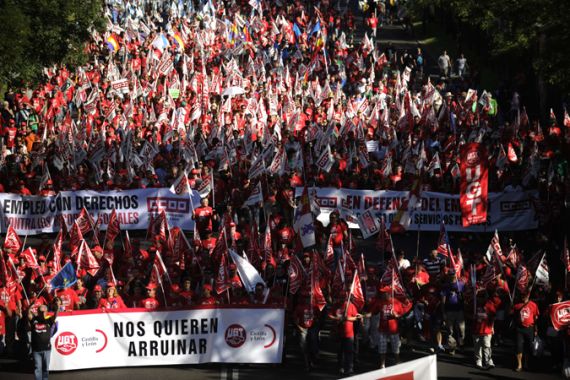Spain and Portugal march against austerity
Protesters descend on Madrid and Lisbon as governments introduce tough new measures to avoid financial bailouts.

Thousands of Spanish and Portuguese protesters have taken to the streets of Madrid and Lisbon to rally against new anti-austerity measures aimed at avoiding international bailouts.
Organisers estimated that 50,000 people turned out in Lisbon on Saturday, where demonstrators threw tomatoes and fireworks at the local headquarters of the International Monetary Fund as anti-riot police stood guard.
Keep reading
list of 4 itemsFacebook, Instagram face EU scrutiny over addictive effects on children
Who benefits from US tariffs on Chinese imports? Experts weigh in
Biden slaps new tariffs on Chinese imports, ratcheting trade war
In Madrid, the demonstrators assembled in groups at noon along the central streets of the capital city in a rally against spending decreases and tax increases – designed to avoid a financial bailout.
“We want to say loud and clear to the government that we do not agree, that its policies cause too much damage, that we will not resign ourselves because there are alternatives,” CCOO trade union head Ignacio Toxo told the rally.
The march came as Luis de Guindos, economy minister, said that Spain’s borrowing costs still do not reflect the country’s economic and fiscal adjustment, despite their recent easing.
Adequate interest rate level
Following an informal meeting of European Union finance ministers in Nicosia, Cyprus, De Guindos asked what would be an adequate interest rate level.
He said: “We believe that with the effort that Spain is making in terms of the commitment to fiscal adjustment and the commitment to economic reforms, the risk premium should be below [current levels].”
In July of this year, Mariano Rajoy’s conservative government eliminated annual Christmas bonus for public workers, which amounted to a seven per cent reduction in annual pay.
|
Counting the Cost: Spain cuts spending |
These measures were part of austerity measures worth 102bn euros ($126.5bn) to be implemented by 2014 to reduce Spain’s public deficit.
Demonstration organisers have argued that the government’s austerity measures are hitting mainly the middle and lower classes and spare the wealthy, as well as large companies.
They want the austerity measures to be put to a referendum.
Over 1,000 buses ferried people to Madrid for the protest, which was co-ordinated by two of Spain’s leading trade unions, CCOO and UGT, along with roughly 150 smaller organisations.
The head of the UGT, Candido Mendez, said Spanish people should be given the chance “to clearly say whether they are in agreement or not” with the spending cuts.
“It is not inevitable that that the markets govern us, that Spain gets a bailout for its economy,” he said.
‘We want our life back’
Demonstrators vented their frustrations by holding aloft banners with slogans such as “Let’s go! They are ruining the country and will have to pay for it.”
The marchers in Lisbon held up banners reading “Screw the troika, we want our life back” in reference to the country’s international creditors, the so-called troika of the Europe Union, the International Monetary Fund and the European Central Bank.
“I’m here because I want my country back, because Portugal does not deserve what they are doing with it,” said Ana Luisa Baltasar, an unemployed teacher taking part in the demonstration.
Portugal’s implementation of spending cuts and reforms is being monitored by “troika” in return for the 78bn euro ($102bn) rescue package the Iberian country received in 2011.
Last week, Pedro Passos Coelho, prime minister, announced an increase in workers’ social security contributions from 11 per cent to 18 per cent of their monthly salary with cuts in employers’ contributions in a bid to kickstart job creation
Unemployment in the country is currently running at more than 15 per cent.